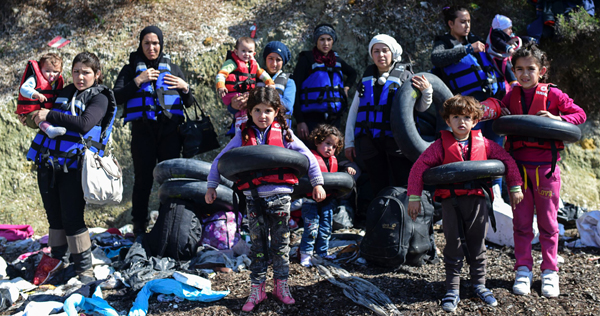ATHENS — Greece warned Sunday that the number of refugees and migrants on its soil could more than triple next month, reaching as many as 70,000, as a Balkan cap on border crossings left thousands "trapped" in the country.
"We estimate that in our country the number of those trapped will be from 50,000-70,000 people next month," Migration Minister Yiannis Mouzalas said.
"Today, there are 22,000 refugees and migrants," he added in an interview with Mega Channel TV.
Some 6,500 people were stuck at the Idomeni camp on Greece's northern border with the former Yugoslav Republic of Macedonia on Sunday as the former Yugoslav Republic of Macedonia border officials let only 300 refugees and migrants pass the day before. On Sunday the crossing remained closed, according to Greek local police.
Several hundred staged a protest on the rail tracks near Idomeni, an AFP photographer said.
The build-up at the camp, which can hold up to 1,500 people, began in earnest last week after the former Yugoslav Republic of Macedonia began refusing entry to Afghans and imposed stricter document controls on Syrians and Iraqis.
But the bottleneck was expected to worsen after EU members Slovenia and Croatia, as well as Serbia and the former Yugoslav Republic of Macedonia, imposed a limit of 580 migrants entering their borders each day.
Those measures came on the heels of a clampdown by Austria, which lies farther up the migrant trail that extends from the Balkans to Germany and Scandinavia.
Austria introduced a daily cap of 80 asylum-seekers and said it would only allow 3,200 migrants to transit the country per day.
As a result, the tighter controls have had a big knock-on effect in Greece, where migrants have been arriving en masse from neighbouring Turkey.
Thousands, including many children, are now stranded there as the European Union struggles with the continent's worst migration crisis since the end of World War II.
Austria-Greece row
The tension has resulted in public spat, with Austria accusing Greece of failing to adequately police its borders under its duty as the southeastern flank of Europe's Schengen passport-free zone.
It also accuses Greece of letting asylum-seekers head northward instead of requiring them to process their application in the country of arrival.
Austrian Chancellor Werner Faymann on Sunday lashed Greece for "behaving like a travel agency and letting all the migrants through".
"Last year, Greece took in 11,000 asylum-seekers, we took in 90,000. That can't be allowed to happen again," he told Austrian media.
Mouzalas though said Austria's politicians were talking with one eye on the electoral calendar: presidential elections are due in April.
"Austria is a friendly country. They have reacted this way because of course they have accepted many migrants but also because elections are on the way," he told Mega TV.
Mouzalas said he expected the influx to slow when the information about closed borders spread in Turkey, where more than two millionpeople fleeing the war in Syria have taken refuge.
He also said the campaign alongside NATO's presence in the Aegean Sea, which is helping to police Greek waters, was expected to reduce arrivals by 70 per cent.
On Saturday, Mouzalas told Sto Kokkino radio that Greece intends to create provisional camps across the country to accommodate up to 3,000 people each, but "preferably 1,000 people, in order to cover their basic needs for a little while”.
In a bid to regulate the flow of refugees until the border situation is resolved, Greek authorities are trying to house them on the Aegean islands where migrants' arrivals, despite the good weather conditions, have decreased, Greek authorities say.
Italy braces for influx
Pope Francis used his weekly address on Sunday to hail the "generous help" offered by Greece to migrants and to urge European countries to work together to "share the burden fairly".
In Italy, authorities are making preparations in case the border closures redirect the migrant flow towards the southeastern province of Puglia, which lies across the Adriatic Sea from Albania.
Coastguards and customs officials are patrolling the 300-kilometre coastline, which has numerous secluded beaches where boats can land discreetly.
Meanwhile, German Interior Minister Thomas de Maiziere said he wants to speed up repatriations of rejected asylum seekers from North Africa.
Modern technology such as biometric identity papers could help, he said, adding that "we could imagine offering our support" in the area.
